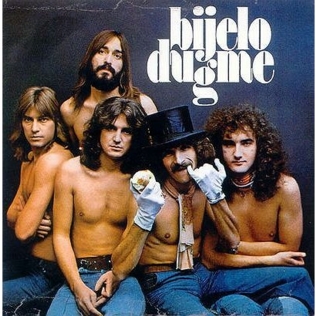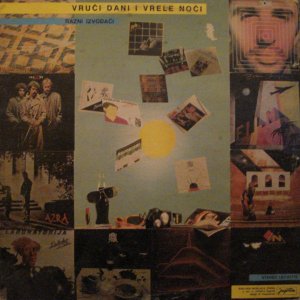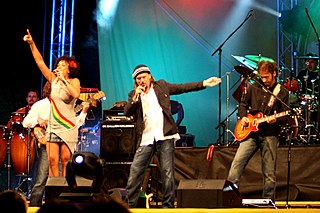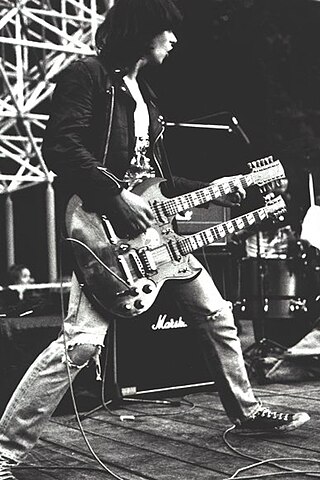Related Research Articles

Zdravko Čolić is a Bosnian pop singer and is widely considered one of the greatest vocalists and cultural icons of the former Yugoslavia. Dubbed the 'Tom Jones' of the Balkans He has garnered fame in Southeastern Europe for his emotionally expressive tenor voice, fluent stage presence and numerous critically and commercially acclaimed albums and singles.
Time was a rock band from Yugoslavia that was formed in 1971 by Dado Topić (vocals) after leaving his previous band Korni Grupa. The original lineup consisted of, in addition to Topić, Tihomir "Pop" Asanović (organ), Vedran Božić (guitar), Mario Mavrin (bass), Ratko Divjak (drums) and Brane Lambert Živković. Time frequently changed lineup and after three albums and many tours disbanded in late 1977 and Dado Topić started his solo career. In 1998 and 2001, Time reunited to play a limited number of live concerts. Now they still play together as a rock trio.

Tereza Ana Kesovija is an internationally acclaimed Croatian recording artist. She was one of the most recognizable figures on the music scene in former Yugoslavia, and is renowned for her wide vocal range and operatic style. She also had a successful career in France. She has held many concerts around the world, being one of the few Yugoslav musicians to have sold out shows in The Royal Albert Hall, L'Olympia and Carnegie Hall.

Parni Valjak is a Croatian and former Yugoslav rock band. They were one of the top acts of the former Yugoslav rock scene, and one of the top rock bands in Croatia.
Mate "Mišo" Kovač is a Croatian recording artist. He is the best selling artist from Croatia, with well over 20 million records, cassettes and compact discs sold to date, and is often regarded as one of the most popular musical performers from Southeastern Europe.

Film was a Yugoslav rock group founded in 1978 in Zagreb. Film was one of the most popular rock groups of the former Yugoslav new wave in the late 1970s to early 1980s.
Branimir "Johnny" Štulić is a Yugoslav singer-songwriter, musician and author, best known for being the frontman of the popular Yugoslav rock group Azra. He is known for his charismatic stage performances and inspiring song lyrics that often combined rock poetry with a strong sense for social commentary, which is the cause for his becoming a cult figure.

Jugoton was the largest record label and chain record store in the former Yugoslavia based in Zagreb, SR Croatia.

Veljko Despot is a Croatian music journalist and record business entrepreneur. He has been involved in all aspects of the music industry as manager-director, record label owner, reporter, chief editor, radio and TV program director. In 1998, Despot received recognition from the Croatian government as one of top private entrepreneurs in the country.

Bijelo Dugme was a Yugoslav rock band, formed in Sarajevo, SR Bosnia and Herzegovina in 1974. Bijelo Dugme is widely considered to have been the most popular band ever to exist in the former Socialist Federal Republic of Yugoslavia and one of the most notable acts of the Yugoslav rock scene and Yugoslav popular music in general.

Suzy Records is a record label based in Zagreb, Croatia.

Vrući dani i vrele noći is a compilation album released by Jugoton in 1982 in the former SFR Yugoslavia.

Aerodrom is a Croatian rock band from Zagreb.

Croatian popular music is the popular music of Croatia.

Korni Grupa was a Yugoslav rock band formed in Belgrade in 1968. Korni Grupa, also known as the Kornelyans, the name which they used during a short-lived foray into the international market, was one of the first Yugoslav rock bands to achieve major mainstream popularity, and often considered the first Yugoslav supergroup. Korni Grupa is considered to be one of the most prominent and influential bands in the history of rock music in Yugoslavia.

Saša Novak Radulović is a Croatian guitarist. He is the former guitarist and producer from the band Psihomodo pop. He started his career in Karlovac as the leader of the famous local punk-rock band Nužni izlaz.

Dah was a Yugoslav and later Belgian progressive rock band formed in Belgrade in 1972.
Dubrovački trubaduri was a Croatian beat, folk and pop band from Dubrovnik formed in 1961 by Đelo Jusić, main composer, guitar and mandolin player and leader of the group. They were very popular in Yugoslavia during the 1960s and 1970s for their mixture of pop music and medieval folk traditions of their native ancient city on the Adriatic coast. Internationally also known as 'Dubrovnic Troubadours or The Troubadours Of Dubrovnik, they enjoyed brief popularity across Western Europe having appeared at the 1968 Eurovision Song Contest in London. Their song "Jedan dan" was performed by their singers Luciano "Lući" Capurso and Hamo Hajdarhodžić and it scored 7th position. Their other major hits include "Dok Palme Njišu Grane" from 1971, and the Italian-influenced "Noćna Muzika" from 1972. The group, in different line-ups, existed until the early 1980s when they broke up.

Azra is the debut album of the Yugoslav/Croatian rock band Azra, released through Jugoton in 1980.
Grupa 220 was a Yugoslav rock band from Zagreb founded in 1966. It was formed through merging previous instrumental rock groups Ehos and Jutarnje zvijezde. They are notable for publishing the first authored works in the local field of rock n' roll and the first hit in the genre, which made them popular across the country. They were one of the pioneers of Yugoslav rock music. They published their first EPs in 1967, "Osmijeh" and "Kad bih bio Petar Pan", with their first full album "Naši dani" releasing in 1968.
References
- ↑ John Shepherd (2005). Continuum encyclopedia of popular music of the world, Volumes 3-7. Continuum. p. 141. ISBN 0826474365 . Retrieved 23 June 2012.
- ↑ An interview with Drago Mlinarec, jetset.cro.net